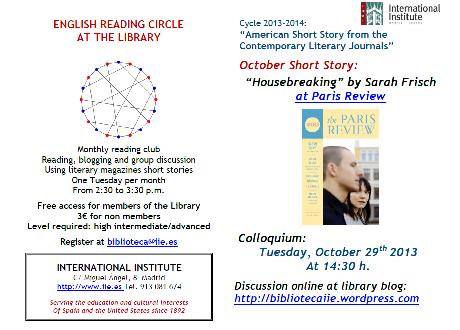
- Posted: 22 octubre, 2013
- By: Instituto Internacional
- Comments: No Comments
Introductions and Sarah Frisch’s “Housebreaking”
Details October session Reading Circle 2013
Welcome fellow bibliophiles and literati to the 2013 installment of the IIE library’s English-language reading circle. I’ll be moderating our first two sessions, beginning next Tuesday, October 29th. Peter’s left some sizeable shoes to fill in his absence, but I’m eager to get to the good work of literary interpretation, criticism, and general contemplation.
This year’s theme is deceptively simple: American Short Stories from Contemporary Literary Journals. But as is the case with all things meaningful, the devil is in the details, or, as it were, the modifiers. Rather than clarify our purpose in reading, the above begs a series of open-ended questions: ‘American’ how? Is ‘Literary’ a stable descriptor, or does it depend on the medium as much as the message? And can a ‘Journal’ really be ‘Contemporary’ in this day and age? These are meaningful questions that deserve thoughtful responses; in other words, the perfect fodder for our circle.
In approaching the cycle through our first story, Sarah Frisch’s “Housebreaking,” I encourage you to consider these questions in the context of The Paris Review, an undeniably canonical (if we can apply that term to a publication, and perhaps we cannot, you tell me) bastion of global literariness if ever there was one. Taking this logic a step further, we might consider too the dynamics of contributing to a prestigious journal, and how that authority exercises something like poetic soft power on the work published. Then again, maybe power in this arena isn’t what it used to be. Is the struggle to attain literary prestige still an insider’s game, where certain ladders must be climbed in order to appease the legislators of cultural sensibility? Or is literary prestige itself a vanishing (or perhaps mutating) commodity, given the explosion of independent media platforms in our digital and heteroglossic age? Has the world changed? Have we?
These last two questions echo throughout “Housebreaking,” and Frisch does a compelling job exploring them in the fullness of their complexity. Complexity and its critical mass are among the governing themes of the piece, and ideas I’d to tease out in our meeting next week. Rather than delve too deeply into meat better served in company, I’ll list yet another series of questions that I hope will guide your reading of a story that, like our cycle, is deceptive in its simplicity:
– Where and how can we locate the phenomenon of crisis in this piece? How does epistemology, the nature of knowing, evolve over the course of the story? What does the title have to do with it? How about the epigraph?
– What does the story tell us about the difference between morality and ethics? Ideology and love? How to think and how to act?
– Why does Seamus allow Miranda to take him to the doctor?
– What does “being right” mean here?
These are just a few of many lines of attack we can follow when we come together next week. If you’re inclined to foment discussion virtually by adding a comment below, then by all means have at it. I look forward to meeting all of you soon, and can’t wait to get our hands dirty sifting through stories.
Andrew Bennett.
Search
Categorías
Noticias recientes
-

“We Read Banned Books” en la biblioteca del Instituto Internacional
8 octubre, 2025 -

Nueva edición del Coloquio de la Mujer: mujeres y gastronomía
30 abril, 2025 -

New Edition of the Women’s Colloquium: Women and Gastronomy
30 abril, 2025

